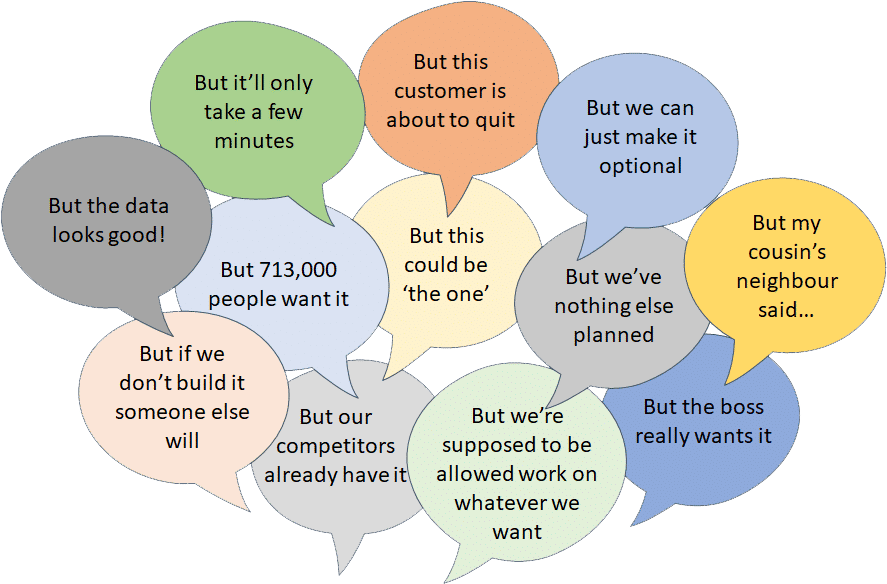
As a Product Manager, you may well have been called the ‘sales prevention department’ by some of your colleagues. Don’t worry – we don’t think it’s a bad thing.
We recently came across a great post here by Des Traynor of Intercom about the importance of saying “No”. It’s so good we thought we’d share it and add a few extra thoughts of our own.
12 (bad) reasons to say “Yes”
In his article Des sets out 12 reasons people use to justify a “Yes”. We’ve heard them all at one time or another, often coming from Sales or Marketing, and I am sure you will have too… 
There are many more.

It can be very tempting when big numbers start flying about and high-pressure techniques like promising to ‘sign today’ are employed.
Also, the label ‘strategic’ is often used and abused by Sales for their current favorite customer or hot lead without ever considering the strategic fit.
The problem is that it takes you down the road of bespoke-ware which can turn your product into a Frankenstein monster and erode your economies of scale.
Take a balanced view
Deciding what you will (and will not) include in your product is your job as a Product Manager.
There is a commonly quoted view that for a designer something isn’t finished “until there is nothing more that can be taken away”. Similarly, for engineers, you could say that they don’t consider something is finished until it does everything it possibly can, as well as it possibly can, and uses all the latest technology. This is sometimes known as ‘gold-plating’. And for Sales, a product isn’t finished until all the customer requests have been met and the sale is made.
As a Product Manager, your role is to balance these different perspectives. You need to ensure you are delivering a product that truly provides value by solving the customer’s problem. It also has to be easy to use. But it also has to fulfill your business goals of, for example, being profitable.
There are too many good ideas
Des also reminds us that in reality, many of the requests you receive will be good ideas. But that having good ideas to work on is not the greatest limiting factor in your business. You probably have too many good ideas to ever deliver!
So, you should choose to work only on the best ideas.
For the good ideas that you’re not going to progress you need to clearly say, “This is a really great idea, I can see why our customers would like it. Well done. But we’re not going to build it. Instead, here’s what we’re going to do.”
This approach makes saying ‘No’ very powerful because it allows you to acknowledge and realign the requester in the direction that the product is actually heading.
Yes, there are lots of good ideas but with limited time and resources, you need to select the best idea. If you’re looking for a tool to help you our blog on roadmap prioritization is worth reading.
Heroes say “Yes”
We were all brought up watching superheroes defeat villains. It’s ingrained in our psyche that being a hero is a great thing to be. We want to swoop in and save the day.
A number of the attendees at our recent Leading Product Management course commented on how this is one of the hardest things to overcome when trying to reduce the amount of firefighting that Product Managers do.
Saying “Yes” gives them that feeling of saving the day in the short term. It makes the demanding people who are right in front of them go away. But it creates all sorts of fires that have to be sorted out later in other parts of the business.
Villains say “No”
Saying “No” might place a sale in jeopardy or make your boss unhappy. You might be thought of as a villain, not a team player, or called the ‘sales prevention department’.
Being accused of this is not a comfortable place to be in, but you need to remind yourself it is for the greater good. It’s your job to bring balance and realize the company vision and strategy through your product.
You need to be brave and take a balanced longer-term view.
Here is a link to that post again.
Andrew Dickenson
Director, Product Focus


Join the conversation - 1 reply
Great post Andrew!. Particularly pertinent challenge for me and my team at the moment. Would be interested to know other peoples thoughts on how to deal with this when
1. The organisations doesnt have clearly defined strategy and objectives meaning the focus is always on the next quarter. Very difficult if your goal is to hit this quarters numbers. I guess this isnt really operating as a product organisation
2. How to do this whilst still maintaining good relationships with all your stakeholders